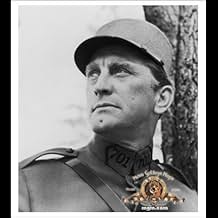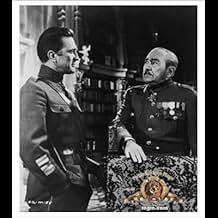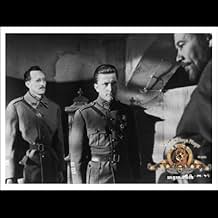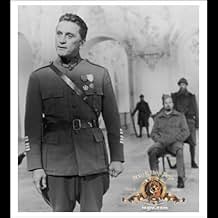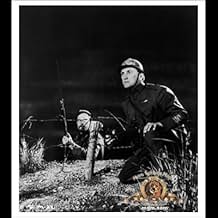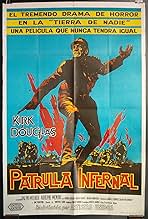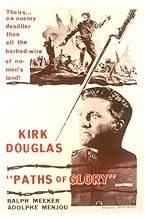Après avoir refusé d'attaquer où l'ennemi était ammassée, un général accuse les soldats de lâcheté et leur officier commandant doit leur défendre.Après avoir refusé d'attaquer où l'ennemi était ammassée, un général accuse les soldats de lâcheté et leur officier commandant doit leur défendre.Après avoir refusé d'attaquer où l'ennemi était ammassée, un général accuse les soldats de lâcheté et leur officier commandant doit leur défendre.
- Réalisation
- Scénario
- Casting principal
- Nomination aux 1 BAFTA Award
- 5 victoires et 3 nominations au total
- Pvt. Pierre Arnaud
- (as Joseph Turkel)
- German Singer
- (as Susanne Christian)
- Capt. Sancy
- (non crédité)
Résumé
Avis à la une
Now, fifty years later, the film is still timely, having lost none of its power to illuminate. Thanks be to Kirk Douglas for taking a chance on an unproven Stanley Kubrick and getting Allied Artists to finance what was so clearly a non-commercial project. I suspect too, that it was at AA's insistence that Hollywood veterans be cast, even though the movie was shot to great advantage amidst the majestic settings of old Europe. Given the film's message, I think Kubrick would have preferred no-name principals, but then, who could have surpassed the oily charm of Adolphe Menjou's diabolical general, or the pathetic repulsiveness of Timothy Carey's sacrificial dog-face. (It's ironic that the part of the cowardly lieutenant went to an authentic war-hero, naval air-ace Wayne Morris, then only two years away from an untimely death.) This many decades later, I still have mixed feelings about the celebrated final scene. On one hand, it's so clearly manipulative (someone once called it a "male weepie"), that I try to steel myself against its undeniable force; on the other, it's so superbly well done that the humming chorus of universal brotherhood never fails to move me, even after this many viewings.
Researchers digging into origins of 60's counter-culture should check out themes and characterizations of the screen-play, particularly Timothy Carey's social outcast and Fred Bell's absolutely stunning thirty seconds of emotional break-down. For this is one of the few films from the conformist Eisenhower era to cast a shadow forward in time and serve as a reference point for future generations. The film's abundant cynicism may no longer be as revealing as it once was, thanks to Vietnam. Yet the emotional honesty remains as fresh and compelling as ever in its search for a gut-level depiction of real human anguish. Above all, Kubrick's anti-war classic points toward a more civilized potential amidst the barbarities and passions of combat, whether French or American, and given present political realities, still has many lessons to offer.
Winston Churchill famously claimed that it was this movie that was closest to evoking the atmosphere of WW1 and the military mind. And you know what, he is right. For one thing, Paths of Glory is gorgeously filmed, with relentlessly beautiful cinematography and nice costumes and scenery. The screenplay is sometimes humorous, sometimes moving and sometimes even haunting, either way it was some fine writing. The efficiency of Kubrick's direction is proof of a great man at work.
The performances were superb. As the general who orders the hopeless attack on the German position, Adolphe Menjou's character is perceived as a villain not because of being an officer adhering to the letter, but that he is seen as "the arrogant aristocrat" because of his fear of the working classes than his hatred of the enemy. Among the cast, Timothy Carey and Kirk Douglas especially were outstanding. And the music? That is one rousing score I can tell you. Great movie. 10/10 Bethany Cox
I don't care how much you HATE B&W films - put this one on your MUST-SEE. Compelling cinema-verite photography creates astounding visuals from a varity of incisive angles; like the famous mobile wide-angle tracking shot of Dax (probably Kirk Douglas's most stirring and important performance) moving through the squalid and horrifying trenches as the battle begins with explosions breaking out all over. The suspense and tension is frightening, but almost beautifully eerie in the most compelling ways as Kubrick takes us through the deadly limbo of no-man's land - the 'paths of glory' which finally leads to the grave. The action, skillfully combined with powerful moral and existential themes are amazingly conveyed through the bleak yet articulately stunning visuals. THIS IS A FILMMAKER'S FILM!
The moral outrage of the sadistic injustice of the military courtmartial never fails to make my blood fully boil. The hypocrisy and corruption is degradingly infuriating. If anything will make a cynic out of you, it's this appropriately pessimistic and depressing cinema chronical based on a true stupid incident in WWI. What's even worse is how POG, in many perceptive ways, serves as an allegory for all the B.S. in real life: Pig-headed leadership in the parasitic hands of the superior greed freaks, two-faced deceptive manipulations, double-standards, backstabbings, social bigotry, arm-chair warriors, egotism, corrupt politics, the militaries's abuse of too much power - and it's destructive desire at satisfying it's lust for vainglory (sounds a little like Hollywood) - Did I leave anything out? You name it, POG has it - and I'm not being sarcastic.
The entire ensemble cast is superb with special mention to George Macready as the utterly pompous power-mad glory-seeking "soldier", General Mireuo (who thinks nothing about ordering his troops to open fire on his own men for not charging out of the trenches and dying for his "country"; which smells a bit like ME ME ME). Don't worry, you'll throughly hate his guts. It truly is true method acting. Again, kudos to Macready, a fine actor who was always too good at playing highly unethical villians. (Incidently, this was a favorite film of a young 195O's Marlon Brando and old salty Winston Churchill, who praised Kubrick's incisive authenticity in the exciting battle scene, which does resemble news footage).
Timothy Carey (also ultra-offbeat-cool in Kubrick's other exceptional early flick, "The Killing") is morbidly humorous and gut-wrenching as one of the poor fools coldly picked to be executed; all in the ruthless 'patriotic' name (and amoral game) of 'glory'. ARE ANY OF OUR LEADERS LISTENING? Too bad that Carey's memorable talents were so underused by Hollywood, but that always seems to be the unfortunate norm. A little like what ironically happens to him in this intriguing but downbeat story.
Ralph Meeker (who was also memorable as the brutal and ruthless Mike Hammer in the 5O's cult gem "Kiss Me Deadly" - a complete opposite role that shows a true range of his acting abilities) delivers another wretching performance as the true brave soldier unjustly sentenced for "Cowardice in the Face of the Enemy". (Maybe he should have turned 'about face', but it would have still been 'damned if he did and damned if he didn't' - another grim moral theme here). His breakdown scene right before he is to be taken out and shot is terribly heartbreaking, for I felt so wanting, but helplessly unable, to come to his help.
Take my word for it, everyone else is awesome; a true actor's dramatic show with dark satirical overtones. POG goes beyond the mere preaching anti-war diatribe (though it does convey that almost naturally, like going without having to say). It's a great classic morality play that will really make you stop (many, many times) and truly make you think (many many times). Airheads not allowed. Moreover, this haunting and disturbing masterpiece is top entertainment, something too many art films aren't. >
It will really make you question things about our troubled, convoluted world and how things are to often immorally and inhumanly run all in the sick name of greed and destructive power. Not too lovely, for the director pulls no punches. This film really has grown more profound (and currently pertinent) since its initial release. Also the editing is taut and concise; there isn't a single wasted moment. Count the number of films on one hand that has accomplished that miraculous feat; that most critics and user commentators are always rightfully harking on. I'll shut up now. Go see this one-of-a-kind film, then see it again - and again, etc. >
The setting is the Western Front of 1916 in the trenches with French soldiers faced off against an invisible German force across a barren No Man's Land. The German's are never seen and the dramatic "combat" is between vain French officers as they vie for prestige and honors. The victims are the innocent French soldiers under their command who suffer miserably because of their arrogance and ignorance.
Brilliant, gripping, and definitely a "must see".
This is a thought-provoking and intelligent war drama perfectly acted by strong cast and masterfully directed. Interesting screenplay based on a Humphrey's Cobb's novel has been well adapted by Stanley Kubrick and Jim Thompson . It depicts a brooding study about futility and insanity of war , making a shattering accusation against the military ruling staff who cares on promotions more than the soldiers . Kirk Douglas is very good as compassionate French Colonel who commands his troops in some spectacular scenes on the trenches . Stunning support cast beautifully performed by notorious secondaries , such as : Emily Meyer as the priest , Wayne Morris as the lieutenant , Richard Anderson as the Major prosecutor , Ralph Meeker , Timothy Carey , Joe Turkel and Suzanne Christian , Kubrick's wife . Special mention for the two selfish and ruthless Generals exceptionally performed by George Macready and Adolph Menjou . Excellent cinematography in black and white by cameramn George Krause , filmed on location in Schleissheim Palace, Munich, and Bavaria Film studios, Geiselgasteig, Grünwald, Bavaria, Germany (studio). The motion picture was wonderfully realized by the maestro Stanley Kubrick and lavishly produced by James B. Harris , his usual producer at the time . This magnificent film along with ¨ All quiet on the Western front ¨ , ¨Westfront 1918 ¨, ¨ Captain Conan ¨ and ¨King and country¨ result to be the best ones about the powerful antiwar theme . Time hasn't dimmed its power , or its poignancy and remains untouchable the critique to the military hypocrisy in an ultra-lucid exposition . Rating : 8.8/10. Phenomenal and marvellous film , above average . Essential and indispensable watching .
Le saviez-vous
- AnecdotesBanned in Spain under Gen. Francisco Franco's dictatorship for its anti-military message. It wasn't released until 1986, 11 years after Franco's death.
- GaffesCol. Dax commits a glaring military faux pas by jamming his hands into his pants pockets while standing and walking in the courtroom during the trial. No military officer would do such a thing, particularly in such a formal setting as a court martial.
- Citations
Pvt. Pierre Arnaud: I'm not afraid of dying tomorrow, only of getting killed.
soldier in bunk: That's as clear as mud.
Pvt. Pierre Arnaud: Well, which would you rather be done in by: a bayonet or a machine gun?
soldier in bunk: Oh, a machine gun, naturally.
Pvt. Pierre Arnaud: Naturally, that's just my point. They're both pieces of steel ripping into your guts, only the machine gun is quicker, cleaner, and less painful, isn't it?
soldier in bunk: Yeah, but what does that prove?
Pvt. Pierre Arnaud: That proves that most of us are more afraid of getting hurt than of getting killed. Look at Bernard. He panics when it comes to gas. Gas doesn't bother me a bit. He's seen photos of gas cases. Doesn't mean anything to me. But I'll tell you something though, I'd hate like the devil to be without my tin hat. But on the other hand I don't mind not having a tin hat for my tail. Why is that?
soldier in bunk: You're darn tootin', because...
Pvt. Pierre Arnaud: Because I know a wound to the head would hurt much more than one to the tail. The tail is just meat but the head- ah, the head is all bone.
soldier in bunk: That's...
Pvt. Pierre Arnaud: Tell me this. Aside from the bayonet, what are you most afraid of?
soldier in bunk: High explosives.
Pvt. Pierre Arnaud: Exactly, and it's the same with me, because, because I know that it can chew you up worse than anything else. Look, just like I'm trying to tell you, if you're really afraid of dying you'd be living in a funk all the rest of your life because you know you've got to go someday, anyday. And besides...
soldier in bunk: Yes?
Pvt. Pierre Arnaud: If it's death that you're really afraid of why should you care about what it is that kills you?
soldier in bunk: Oh, you're too smart for me, Professor. All I know is, nobody wants to die.
- Versions alternativesThe Criterion DVD version features the opening and closing MGM logos.
- ConnexionsEdited into Hai-Kubrick (1999)
- Bandes originalesLa Marseillaise
(1792) (uncredited)
Written by Claude Joseph Rouget de Lisle
In the score during the opening credits
Meilleurs choix
- How long is Paths of Glory?Alimenté par Alexa
Détails
- Date de sortie
- Pays d’origine
- Langues
- Aussi connu sous le nom de
- Patrulla infernal
- Lieux de tournage
- Schloß Schleißheim, Oberschleißheim, Bavaria, Allemagne(Command Headquarter)
- Société de production
- Voir plus de crédits d'entreprise sur IMDbPro
Box-office
- Budget
- 935 000 $US (estimé)
- Montant brut mondial
- 8 290 $US
- Durée1 heure 28 minutes
- Couleur
- Mixage
- Rapport de forme
- 1.66 : 1
Contribuer à cette page







